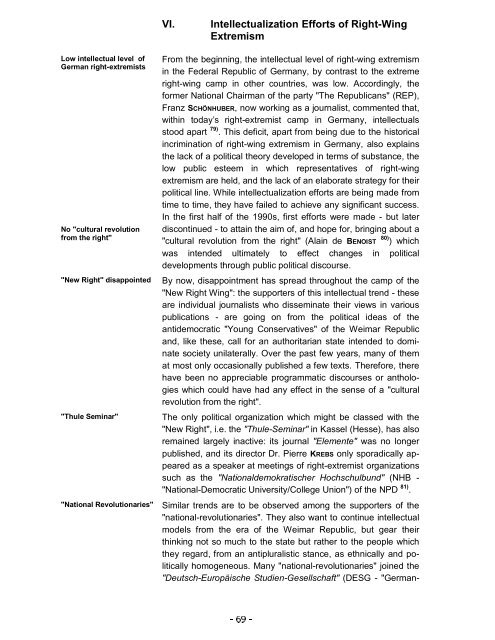Left-Extremist Endeavours
Left-Extremist Endeavours
Left-Extremist Endeavours
You also want an ePaper? Increase the reach of your titles
YUMPU automatically turns print PDFs into web optimized ePapers that Google loves.
Low intellectual level of<br />
German right-extremists<br />
No "cultural revolution<br />
from the right"<br />
VI. Intellectualization Efforts of Right-Wing<br />
Extremism<br />
From the beginning, the intellectual level of right-wing extremism<br />
in the Federal Republic of Germany, by contrast to the extreme<br />
right-wing camp in other countries, was low. Accordingly, the<br />
former National Chairman of the party "The Republicans" (REP),<br />
Franz SCHÖNHUBER, now working as a journalist, commented that,<br />
within today’s right-extremist camp in Germany, intellectuals<br />
stood apart 79) . This deficit, apart from being due to the historical<br />
incrimination of right-wing extremism in Germany, also explains<br />
the lack of a political theory developed in terms of substance, the<br />
low public esteem in which representatives of right-wing<br />
extremism are held, and the lack of an elaborate strategy for their<br />
political line. While intellectualization efforts are being made from<br />
time to time, they have failed to achieve any significant success.<br />
In the first half of the 1990s, first efforts were made - but later<br />
discontinued - to attain the aim of, and hope for, bringing about a<br />
"cultural revolution from the right" (Alain de BENOIST 80) ) which<br />
was intended ultimately to effect changes in political<br />
developments through public political discourse.<br />
"New Right" disappointed By now, disappointment has spread throughout the camp of the<br />
"New Right Wing": the supporters of this intellectual trend - these<br />
are individual journalists who disseminate their views in various<br />
publications - are going on from the political ideas of the<br />
antidemocratic "Young Conservatives" of the Weimar Republic<br />
and, like these, call for an authoritarian state intended to dominate<br />
society unilaterally. Over the past few years, many of them<br />
at most only occasionally published a few texts. Therefore, there<br />
have been no appreciable programmatic discourses or anthologies<br />
which could have had any effect in the sense of a "cultural<br />
revolution from the right".<br />
"Thule Seminar" The only political organization which might be classed with the<br />
"New Right", i.e. the "Thule-Seminar" in Kassel (Hesse), has also<br />
remained largely inactive: its journal "Elemente" was no longer<br />
published, and its director Dr. Pierre KREBS only sporadically appeared<br />
as a speaker at meetings of right-extremist organizations<br />
such as the "Nationaldemokratischer Hochschulbund" (NHB -<br />
"National-Democratic University/College Union") of the NPD 81) .<br />
"National Revolutionaries" Similar trends are to be observed among the supporters of the<br />
"national-revolutionaries". They also want to continue intellectual<br />
models from the era of the Weimar Republic, but gear their<br />
thinking not so much to the state but rather to the people which<br />
they regard, from an antipluralistic stance, as ethnically and politically<br />
homogeneous. Many "national-revolutionaries" joined the<br />
"Deutsch-Europäische Studien-Gesellschaft" (DESG - "German-<br />
����















